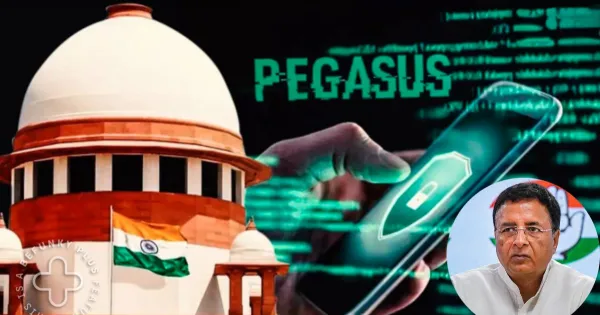Pegasus genie out once again. Surjewala demanded making the committee report public.
For the first time, a major decision of an American court has come in the Pegasus spyware case. The court held Israeli company NSO Group guilty. In 2019, WhatsApp had accused NSO Group of hacking the phones of 1400 people through Pegasus spyware by taking advantage of a bug in WhatsApp. The case of Pegasus and WhatsApp is going on in India also.
After the US court order, Congress leader Randeep Singh Surjewala has sought answers from the Modi government. Randeep Surjewala attacked the central government by posting on X. He said the verdict in the Pegasus spyware case proves how 300 WhatsApp numbers of Indians were targeted in an illegal spyware racket. The time has come for Modi government to answer. Who are the targeted 300 names? Who are the two Union Ministers? Who are the three opposition leaders? Who is the constitutional officer? Who are journalists? Who are the businessmen?
The decision by a US court came in a case filed by Meta-owned WhatsApp against NSO Group, in which the judge in the case, Phyllis Hamilton, said that the Israeli spyware maker was guilty of targeting the devices of 1,400 WhatsApp users and violating the Computer Fraud and Abuse Act (CFAA). ), a federal cybersecurity law, and a similar state law in California called the California Computer Data Access and Fraud Act (CDAFA).
In the year 2021, it was reported that Pegasus was used on more than 300 Indian mobile numbers, including those of two serving ministers of the Narendra Modi government, three opposition leaders, a constitutional authority, several journalists and businessmen. This revelation prompted the Center to Questions have been raised over the involvement of the government and state governments in the attacks, as the NSO Group has repeatedly said that it deals only with governments and government agencies.
However, it should be noted that as part of the WhatsApp vs NSO Group case, unsealed documents revealed that NSO Group downplayed its role in the deployment of Pegasus for years. Through interviews and assessment of subpoenaed documents, WhatsApp refuted this claim, alleging that Pegasus customers had a “minimal role” in its deployment, while NSO Group managed a large part of the process.
Following media reports in 2021, the Indian government categorically denied all 'exaggerated allegations' of surveillance using Pegasus. In a statement in Parliament at the time, IT Minister Ashwini Vaishnaw said there was “no substance” in the reports. He said India's surveillance laws ensure that “unauthorized surveillance cannot take place”. Reports claimed that Vaishnav himself could be the target of the use of Pegasus.
Following allegations in India that Pegasus was used on civilians, several petitions were filed in the Supreme Court demanding an investigation into the allegations. In 2021, the Supreme Court ordered an investigation into allegations of unauthorized surveillance using Pegasus software. A committee of technical experts was formed for this. In August 2022, the committee of technical experts found no conclusive evidence on the use of spyware in the phones it examined, but said the central government “did not cooperate” with the panel. The report remains sealed and has not been released publicly since.
The central government's involvement in using Pegasus on Indian citizens remains questionable, but the spyware has become a hotly debated topic in at least two states – West Bengal and Andhra Pradesh. In 2021, the West Bengal government constituted an inquiry commission to investigate the alleged surveillance of phones using Pegasus. Its purpose was to investigate and report on reported interceptions and the possession, storage and use in the hands of state and non-state actors of such information gathered through such interceptions.” However, the Commission's work soon It ended because the Supreme Court stayed its proceedings.
In Andhra Pradesh, the issue of alleged use of Pegasus became a political issue between YSRCP and TDP. In 2022, the state assembly passed a resolution to set up a committee to investigate whether the previous Telugu Desam Party (TDP) government had purchased and used Pegasus, following Banerjee's statement that West Bengal Pegasus was offered to.
The then ruling YSRCP in Andhra had alleged that TDP supremo N Chandrababu Naidu had already purchased Pegasus spyware to keep an eye on rival political leaders, including then Chief Minister YS Jagan Mohan Reddy.
Will the Supreme Court proceed to make public the report of the committee of technical experts on Pegasus spyware submitted to it in 2021-22? Surjewala asked whether the Supreme Court will now investigate further in view of India's decision to hack 1,400 WhatsApp numbers, including 300? Will the Supreme Court now ask Meta to submit 300 names to serve the ends of justice in the Pegasus case?
Shouldn't Facebook (now Meta) now take the responsibility of releasing the names of 300 Indians targeted by Pegasus, given that WhatsApp and Facebook have the largest customer base in India and their 'care and commitment' towards their customers in India? 'Duty of Disclosure'? The country wants to know.
In fact, news portal 'The Wire' has claimed in a report that between 2017 and 2019, 300 Indians were spied on through Pegasus spyware, which includes journalists, lawyers, social workers, opposition leaders and businessmen. It is alleged that the phones of these people were hacked.


Comments are closed.